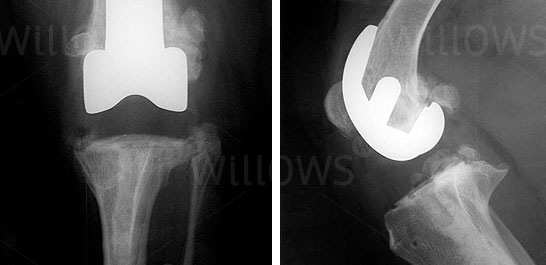Why Should I Bring my Pet to Willows for Total knee replacement surgery?
Orthopaedic Specialists at Willows were amongst the first in the country to introduce TKR surgery, and have over 10 years of experience performing the operation.
Willows hospital facilities are of the highest possible standards, and our orthopaedic surgeons are supported by Specialists in other disciplines including diagnostic imaging, anaesthesia and critical care.
What is a total knee replacement?
Total knee replacement (TKR) is a procedure in which a painful or poorly functioning knee (stifle) joint is replaced with a metal and plastic prosthesis. The operation can be very successful in reducing discomfort and improving limb function.
Why would my dog need a total knee replacement?
TKR surgery is primarily performed in medium and large dogs with persistently painful knees that do not respond well to medical management. TKR is a major operation, and is only considered in dogs where more straightforward surgical procedures are unlikely to be successful. The most common reason to perform TKR is severe knee osteoarthritis.

The surgery
TKR is amongst the most challenging operations performed by veterinary orthopaedic surgeons. A team of two Specialist surgeons, a Specialist anaesthetist and several nurses is involved.
The operation is performed through an incision over the front of the knee. Careful preparation of the two bones that make up the knee (the femur and tibia) is necessary prior to placement of the relevant prostheses. The two artificial components are then brought together and the stability of the knee checked. The capsule that surrounds the joint is carefully sutured prior to closure of the rest of the incision.
Radiographs are obtained at the end of the operation to check the position of the prostheses.
Fig 1 & 2: X-rays showing a total knee replacement

Video 1
Bunty before knee replacement
Video 2
Bunty three months after surgery
Are there any reasons why TKR surgery would not be performed?
Candidates for TKR surgery must be in good general health. Blood tests may be recommended to ensure that internal organs, for example the liver and kidneys, are working properly. The operation cannot be performed if there is any evidence of infection in the joint. TKR would not be performed in a dog whose knee pain could be managed using medications or another more straightforward operation.
What does TKR surgery involve?
A consultation is needed to evaluate your dog prior to the operation. This is done on a separate day to the surgery; often a few weeks before. X-rays are taken to allow detailed planning of the procedure; in some dogs other tests are also performed, such as blood tests or joint fluid analysis.
Aftercare
Aftercare following TKR surgery is very important. Courses of painkillers are prescribed at discharge. Exercise must be very restricted for the first few weeks until the joint capsule and other soft tissues heal. Short walks on a lead are allowed, for toileting purposes only. At other times confinement to a pen or a small room in the house is necessary with avoidance of jumping and climbing. After a few weeks, exercise may be gradually increased in a controlled manner. Physiotherapy and hydrotherapy are important aspects of postoperative care.
The first check-up at Willows is two weeks after the operation. Limb and knee function are evaluated at this time. Depending on progress advice is given regarding increasing exercise. The next check-ups are at six and twelve weeks following surgery when radiographs are obtained to evaluate the prostheses. Further check-ups may be recommended depending on progress.
Risks and complications
Total knee replacement surgery is a major procedure. Knee pain is reduced and limb function improved in the majority of dogs. However, there are potential complications which can include ligament damage, dislocation of the joint, loosening of the prostheses, and infection.
If you have any queries or concerns, please do not hesitate to contact us on 0121 712 7070, or email on orthopaedics@willows.uk.net.
Orthopaedics
Find out more
To assist owners in understanding more about Orthopaedics we have put together a range of information sheets to talk you through the some of the more common orthopaedic conditions seen and treated by our Specialists.

